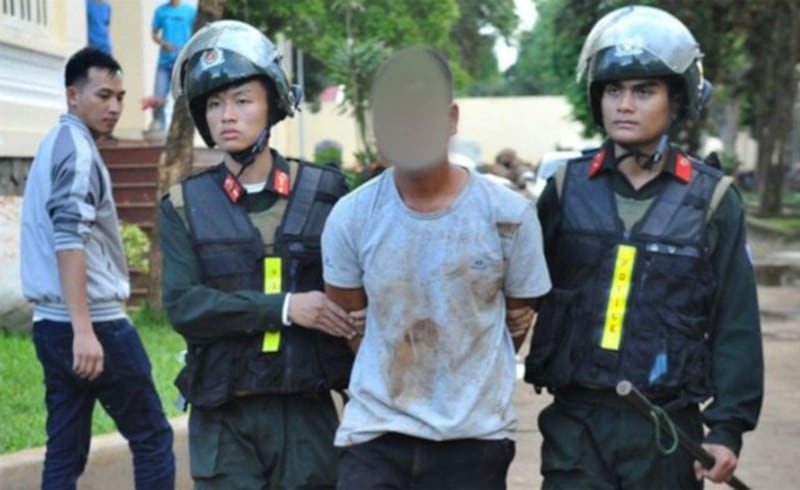Vietnamese security forces have arrested more than 50 people accused of being involved in last weekend’s deadly attacks on two commune offices in central Dak Lak province, a Ministry of Public Security spokesman told state media on Friday.
The June 11 attack left nine people dead.
Those involved in the attacks were young people who harbored delusions and extremist attitudes and had been incited and abetted by the ringleaders via the internet, according to the ministry.
But officials didn’t say who or which organizations had incited or assisted the attackers.
The attacks occurred in an area that is home to about 30 tribes of indigenous peoples known collectively as Montagnards.
Vietnamese state media have reported that the attackers were Montagnards, but the ministry did not identify those arrested as such.
Religious and civil organizations advocating for the Montagnard people told Radio Free Asia in an earlier report that they weren't involved in the armed attacks and condemned the violence.
Anger and frustration in the Central Highlands has built up after decades of government surveillance, land disputes and economic hardship, RFA reported earlier. In recent months, there have been a number of land revocation incidents by local authorities, police and military forces.
Sought to steal weapons
In the ministry’s description of what transpired, about 40 people wearing camouflage vests and equipped with knives and guns split into two groups for a dawn attack on the offices in Ea Tieu and Ea Ktur communes.
Members of the two groups also had broken into Special Forces Brigade No. 198’s barracks in Hoa Dong commune in Dak Lak province to steal weapons, but failed, the ministry told state media.
Those arrested said they sought to steal weapons so as to make news headlines, which they hoped would give them the opportunity to immigrate to other countries, according to the ministry. In their preliminary statements, those arrested said they had been incited by others to kill police officers.
Four police officers, two commune officials and three civilians were killed.
The attackers also kidnapped three civilians, though one of them managed to escape, and the others were rescued later, the ministry said.
The ministry said it would “use all necessary measures” to hunt down and arrest all suspects still in hiding and seize their weapons and explosives.

Vietnam’s one-party government has strictly controlled news about the shootings, heightening people’s curiosity about the incident, but Channel VTV1 of Vietnam Television and many newspapers have published the statements and photos of some of those arrested.
Meanwhile, Prime Minister Hun Sen of neighboring Cambodia ordered armed forces in Mondulkiri, Ratanakiri and Kratie provinces to increase security along the border to prevent fugitives involved in the attacks from crossing the border illegally, China's official Xinhua News Agency reported Friday.
Hun Sen said that anyone arrested would be returned to Vietnam if discovered.
Slapping social media
In the past days, police have fined people who share news about Dak Lak shootings via social media.
At least five Facebook users have been slapped with administrative fines for sharing the news and their comments, deemed to be harmful to the state.
Police in Dak Lak as well as authorities in Kontum and Binh Phuoc — two other provinces in the country’s Central Highlands — have fined businesses that sell imitation camouflage military outfits.
Two human rights lawyers told RFA on Thursday that state media should not have publicly disclosed information from the suspects’ statements to police or their photos, though authorities often take advantage of their power and privilege to provide news organizations with unappealing photos of suspects.
“Publishing citizens’ photos without their permission or without blurring their faces, even if they are suspects or defendants, is a violation of their rights in terms of their image and could cause many consequences, especially when they are in high positions or are influential people,” said one attorney from Ho Chi Minh City, who asked not to be identified.
A human rights lawyer from Hanoi said the Penal Code or the Criminal Procedure Code clearly states that statements from suspects should be kept secret.
Attorney Ha Huy Son, a member of the Hanoi Bar Association, said the country’s 2015 Civil Code contains a provision on the rights of an individual with respect to his image, stipulating that he must give his consent for its public use.
But he also pointed to another article stating that a person’s photo can be used without consent from the individual or his legal representative in cases where it serves national or public interest.
The attorneys also said those arrested should be given immediate access to lawyers to ensure fairness and avoid injustice.
Neither the Ministry of Public Security nor Dak Lak provincial police have opened cases against the suspects, or provided information about their charges.
Translated by Anna Vu for RFA Vietnamese. Edited by Roseanne Gerin and Malcolm Foster.

